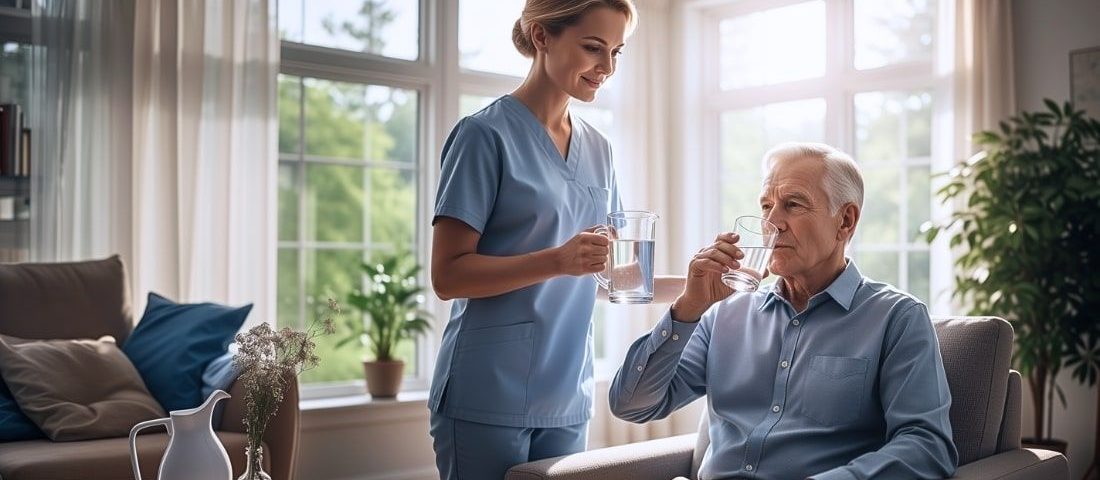
Late summer heat raises the risk of fluid loss for seniors. As the body works harder to stay cool, even mild dehydration can affect mood, energy, and overall health. Aging adds to the challenge since thirst signals weaken, often leaving the body’s needs unmet.
Establishing steady hydration habits in seniors can enhance their overall wellness. Regular fluid intake sharpens focus, boosts energy, and helps the body handle rising temperatures with ease.
This guide highlights the importance of staying hydrated and provides practical tips to stay refreshed throughout the summer.
Why Hydration Matters More in Late Summer
The end of summer often brings high humidity and lingering heat that places extra demands on the body. Seniors are susceptible to these conditions because thirst weakens with age, making it easier to miss fluid needs.
Proper hydration supports clear thinking, healthy circulation, stable blood pressure, and steady energy. That can help seniors stay active, social, and fit during summer. It also helps regulate body temperature during warm days. These benefits make hydration a daily priority for both comfort and overall health.
Simple, Everyday Hydration Habits for Seniors
Staying hydrated does not have to be complicated. With a few adjustments, fluid intake can become a natural part of your daily routine. Try these practical strategies:
- Set a Goal: Aim for six to eight cups of water daily. Use a phone app, a fridge tracker, or a journal to monitor progress.
- Drink Proactively: The sense of thirst weakens with age, so waiting until you feel thirsty may already signal dehydration. Sip fluids regularly throughout the day.
- Pair it With Habits: Link drinking water to routines like taking medication, eating meals, or going for a walk.
- Keep it Close: Place a cup or lightweight, easy-to-hold bottle within reach. Keep it by the bed, reading chair, or table.
- Use Reminders: Set phone alarms or place sticky notes in visible spots as gentle prompts to drink.
- Take Small Sips: Smaller, steady amounts are easier on the body than drinking a large glass all at once.
The Best Fluids to Choose
Water is always the best option for staying hydrated, but adding variety can make it more enjoyable. Mixing in other healthy choices keeps fluid intake interesting while providing extra nutrients and flavor. Consider these options:
- Infused Water: Add slices of lemon, cucumber, or orange for a light, refreshing taste.
- Herbal Teas: Choose caffeine-free or herbal blends to stay hydrated without added sugar or stimulants.
- Hydrating Foods: Snack on fruits and vegetables high in water content, such as watermelon, strawberries, oranges, or cucumbers. Soups and broths also make excellent choices.
Recognizing Signs of Dehydration
Dehydration can occur quickly, especially during warm late-summer days. Knowing the warning signs allows you to act fast and prevent more serious problems. Watch for these common symptoms:
- Dry mouth and lips
- Dizziness or lightheadedness
- Dark-colored urine (should be pale yellow)
- Unusual fatigue or weakness
If these signs appear, increase fluids and rest in a cool area. When needed, reach out for help from family or community staff. Care teams in senior living communities actively support hydration and work to prevent risks.
Family and Community Support
Hydration is a team effort. Having support from loved ones and caregivers can make all the difference. Family members can remind you to drink during visits or share a refreshing beverage.
Senior living communities often incorporate hydration into daily life. Group activities, such as afternoon tea socials or refreshing water stations, make staying hydrated fun and social. This shared support makes it easier to build and maintain healthy habits.
Common FAQs About Senior Hydration
How much water should seniors drink daily?
Most seniors should aim for about six to eight cups of fluid daily, but this can vary. It’s best to check with a doctor for a personalized recommendation.
Are sports drinks or fruit juices safe for older adults?
It’s best to limit these options since they often have a lot of sugar. Water and other low-sugar options like herbal tea are healthier choices for everyday hydration.
What if a senior dislikes plain water?
Try infusing water with fruit slices like lemon or berries. Herbal teas, low-sodium broths, and hydrating foods are also great alternatives.
How does medication affect hydration needs?
Certain medications increase fluid loss. Always consult a doctor or pharmacist for specific hydration needs.
Beat the Late Summer Heat With Care
Wellness begins with simple routines. Choosing the right drinks, staying consistent, and recognizing early signs of dehydration all help protect health and comfort.
At Enrich Senior Living, we prioritize your wellness. Our team encourages daily practices that keep residents comfortable, energized, and thriving.
Schedule a tour today to see how we support every part of your wellbeing.



